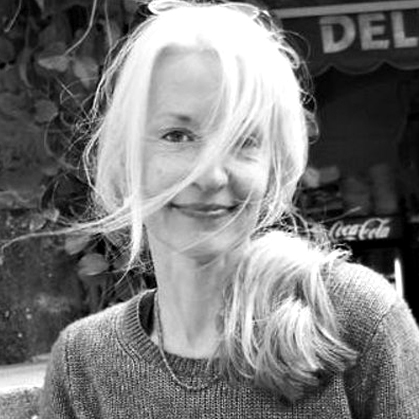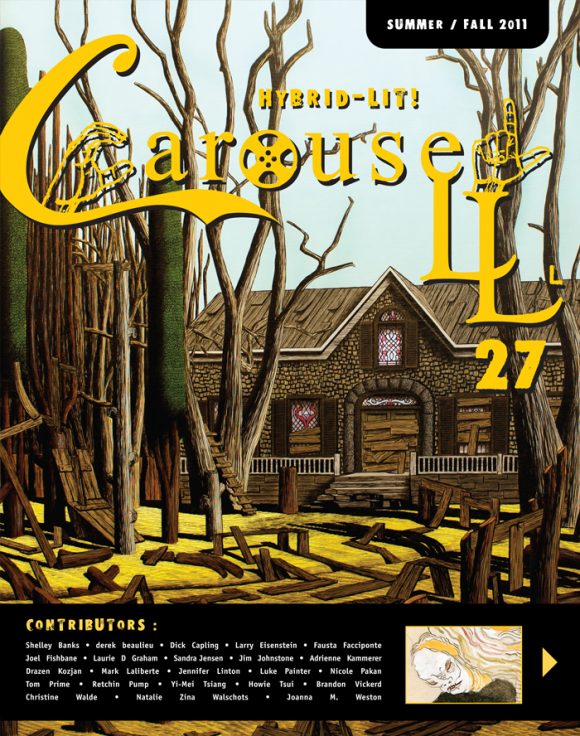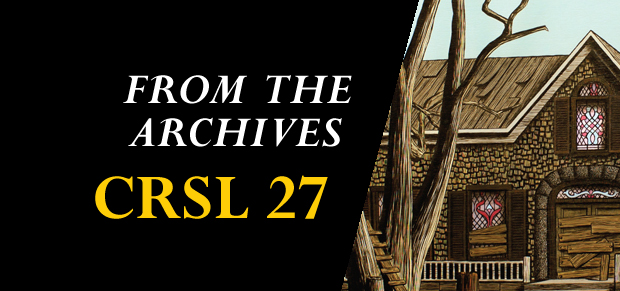From the Archive: Sandra Jensen (CAROUSEL 27)
SANDRA JENSEN
Romeo and the Lonely Girl
Besides the Sunday dance at the Bunbeg Hotel, the only thing I looked forward to was going to sleep. We lived in the middle-of-nowhere-Donegal, surrounded by barren, treeless hills and sheep with scrapies. Excitement consisted of: Cripply-Wipply passing our house on his daily four-mile hobble to the nearest pub; the wurra-wurra bird scaring the bejesus out of me at night; my hair always smelling of peat smoke; oily Ardara sweaters merging into my skin because it was too cold to take them off; endless chores fixing up the house in gale force winds; Katerina, my Afghan hound, bounding over the sheep dotted hills like a gazelle, me wishing I could do the same, her coming back hours later looking, well, sheepish. Once farmer Gormley stomped up to my mother when she was mixing concrete on the scrubby patch beside our house. He pointed his knobbly stick at Katerina who sat looking regal and doe-eyed between my knees. I’ll be shooting her next time, he said.
My mother had decided Ireland had more potential than five hundred acres of Boreal forest in northern Ontario going cheap. More potential for what I wasn’t sure, but Father Murphy had seen the five-minute BBC 2 special on artists in Cornwall and invited her to start up a craft shop and art gallery in his parish. Father Murphy thought she might bring some life back into the area, bring the tourists in, and encourage the locals to be interested in traditional ways. My mother had about as little to do with traditional ways as Katerina had to do with sheep herding, but England was in a recession. People were on the dole and collecting butter vouchers, not art, so she accepted the Father’s invitation, packed up our house in Truro, took me and my brother Tom out of school. You might as well teach yourselves, she said, a decision I happily agreed with.
We moved into an abandoned schoolhouse nestled head-on into a wind-funnelling valley. The roof was caving in and it had no bathroom or running water. We collected our water from a nearby stream until we saw one of Gormley’s sheep floating down, bits of wool swirling around the rocks like pink cappuccino foam. After that we collected rainwater in buckets as it dripped through the ceiling into the living room. And then there was Thucydides to translate. I had chosen Ancient Greek for one of my O-levels. It was an obvious choice, given I was in love with Alexander the Great, but I hadn’t realised it would be years before I got to reading Plutarch in the original. Thucydides’ thumping prose was so boring I could feel my brain melt into bog butter.
Each wind-blown, turf-smelling, Katerina-catching, concrete-block-heaving day was a day closer to the Sunday dance at the Bunbeg Hotel. Weeknights I’d fall into my frigid bed and begin my fantasies. Nighttime was my time to go to him, to Alexander. My time to be whatever he needed, whatever he wanted.
I always knew what Alexander wanted. I was always there, ready for him as he opened the flap of the tent, pulling off his battered helmet, skin covered in battle dust, gold hair dishevelled, tired eyes looking for me. By the flickering light of the oil lamp I saw relief in his face when he found me sitting cross-legged in the corner with his bathwater waiting. Two large buckets, enough to rinse him off, enough for me to slip in afterwards.
We didn’t say anything. There was no need. I stood up, padded quietly to him as he sat down on the bed. I kneeled, pulled off his boots, and unfastened the greaves. His calf was bloody, looked like a pike wound, or maybe the graze of an elephant tusk. He liked to fight in the thick of things, together with his men. He’d not yet healed from the arrow-wound at Sogdiana and the graze had torn the scar open. I turned to get a cloth and bring water. I knew he was too tired to move. He put his hand on my shoulder, held me still. His heat spread through the cotton of my robe. I wore the emerald one, the one I knew he loved. The colour of your eyes, he said. His hand moved to my hair, pulled out the pin, the one with pearls from the Jaxartes river, the one he had left beside my cot the morning of my birthday, before I woke; the morning he killed his friend Kleitos the Black, the morning no one could console him, no one but me. I had climbed under the covers and held him for the whole day, the whole night, as he shook and heaved, biting into the pillow. He tried to tear his own eyes out but I gripped his wrists and pushed my body against him. He stopped struggling when he knew he was hurting me. I’d hid anything he could hurt himself with. I’d hid his sarissa, his sword, the short knife, but I couldn’t hide his hands. I curled my hands into his, whispering, Hurt me, knowing he wouldn’t.
Alexander put the pin on the silk coverlet and ran his hands through my hair. His grey eyes were dark and smouldering in the low light. I would do anything he asked, anything, and he never asked, not once. I dreamed Alexander might marry me, knowing he could not. I was a slave girl and he a king. He had to have a princess for a wife, and that I’d never be. I knew he did not love Roxanne, I even knew it as I listened to her cries in the night. How I hated her! She was snake-eyed and violent tempered. At night she forced him into her. I listened outside the tent, weeping, clutching the pearl-studded hairpin to my chest, wanting to press it into my heart. How could he? I knew what he was doing. I knew he needed an heir, but why her? I pressed the tip of the pin harder until I felt my skin break, until I felt metal on bone, and then I heard his voice, whispering my name. Don’t cry, it’s you I love, he said, standing over me like a shining Apollo. He was Zeus the cloud collector, he was Poseidon the horse tamer, he was Auromazda god of absolute goodness. Alexander was all the gods and he loved me.
I shared his love with one man, a beautiful man, a man who dipped his eyes before me as if I were high born, a man who was kind and gentle. How could I resent Hephaestion who had been there from the beginning? I tried to love Alexander as he did, selflessly.
Alexander fell back on the bed, taking me with him, holding me close. I could smell the sweat of his men. I could smell the smell of death, of victory and defeat. I could smell his hair, his skin, always sweet, a smell of almonds mixed with cinnamon and myrrh.
Sing to me, I heard the thought as if he spoke out loud. I sang a song of my mother who died in childbirth, I sang a song of my wise and gentle grandmother, I sang a song of her sister, priestess of Anaitis; I sang a song of the Lampades, torch-bearing companions of Hekate who came to me in my dreams. I made the song up as I sang, waiting until Alexander was asleep, long golden-brown eyelashes resting gently against his blood-spattered skin. And then I brought the water. It was still warm. I lifted his legs one by one onto the bed, took off his linen cuirass and washed him as softly as I could so as not to wake him. I started with his feet, his long toes, the second one longer than the first, the sign of a hero, the sign of a man loved by gods, the sign of a man who would die before I could say the words, I love you.
Ciarán O’Leary followed me outside the Bunbeg Hotel one Sunday night, me hot and sweaty and cling-filmed into my jeans and cheesecloth tank top, taking a break from the dancing. I thought Ciarán was just coming out for a smoke or to find my brother, Tom. Ciarán was the resident cool guy in the village. He was a real catch in a pool of mostly lumpen and pimple-skinned fish and one I certainly didn’t have a hope in high heaven to hook. I smiled but he was staring blankly into space. I tried to angle myself so the wind didn’t destroy my curling-tonged bangs. I fidgeted with my top. I heard the band start up again, hammering out a track from Thin Lizzy’s “Jailbreak”. They were a two-man show, one playing electric guitar, another a four-piece drum set. Oh poor Romeo, sitting out on his own-ee-o, oh poor Romeo, the guitar player sang. He was bad. I mean really bad, but who cared so long as you’d had a few vodka and oranges. I asked for mine straight up, not because I liked them that way, but because I wanted to impress the cute barman. I was fourteen and looked twenty, or so everyone said, other than Ciarán who hardly spoke a word unless he had to. I turned to go back inside.
— Do you want to go with me? Ciarán asked. I wasn’t sure I’d heard right. His words had hurtled out of his mouth and disappeared into the wind. All the girls wanted him. He couldn’t want me, surely.
— Do you want to go with me? Ciarán repeated, stubbing out his cigarette butt into the gravel with the toe of a polished boot. I thought, Go where? but said,
— That’d be great.
— I’ll see you next Sunday then, Ciarán’s Donegal lilt making my insides turn into honey. — Deadly band playing. Not this feckin’ bollocks. They’ll play some Led Zeppelin. And then he walked away into the billowing darkness, his hips moving like a cowboy.
God. A whole week to get ready. Each day a preparation, each day my heart thumping, my whole body composed of anticipation. I even let my nighttime fantasies veer away from Alexander and edge towards Ciarán. He was tall and slender, hot with a pool cue. He beat my brother at chess and no one beat my brother at chess. My mother thought Ciarán should come and live with us, not in that ruined thatch cottage down the road with his inebriated father and five sheep. How’d he get to be so clever? So worldly? He was the only one in the village who didn’t treat us like aliens. Being English in the Gaeltacht did not exactly endear us to the neighbours.
Ciarán never said much, just looked at you with those grey eyes, a small smile playing on his lips. His hair was a bit of a problem. He had tight, mouse-coloured curls like something you’d scrub the pots with, but his hair was only a problem if you put your hands in it. I had already done that, washing it for him after my mother had accidentally poured whitewash on him as she tipped off a ladder. Ciarán helped out with the building while I cooked for everyone: Ciarán, Mum, Tom, my half-crazy grandmother, Katerina, Father Murphy even, when he decided to pop by and see how things were going with the renovations. I once made him a trifle, using half a bottle of Tom’s distilled gorse wine. I forgot Father Murphy was a teetotaller, but he ate some anyway.
Our first date, I wore my new Levis. They were so tight I had to lie down on the bed to zip them up. I also wore my mother’s midnight-blue polo neck, snug around my breasts. Ciarán and I danced to a tin-eared cover of the Horslips’ “The Blind Can’t Lead the Blind.” Ciarán was a good dancer, didn’t clutch around the back of you looking for something to grab hold of. Ciarán swung his hips and shoulders in time to the music unlike the other Donegal boys who stood like robots, shifting their weight awkwardly from side to side, inching closer and closer until you felt their hot breath on your neck. Ciarán kept a polite distance, but still kept his eyes on you, holding you there. In the break I followed him out back. We hadn’t said anything, it was like a silent pact, we knew what we were doing and where we’d be going, out to the car park, the corner at the end that was dark and rarely used. I leaned against the brick wall, trying to look relaxed.
— You can see Ursa Major, Ciarán said, lighting a hand roll, gazing up, his thick frizzy hair like a helmet, moving in unison with his head. I peered into the night sky.
I had no idea where to look. I wasn’t wearing my glasses.
— Yeah, I said, — amazing.
He pulled me to him, one armed, the other dangling behind him with the fag, and then he covered my mouth with his.
That didn’t feel right. Shouldn’t our lips be together? But no, his had surrounded mine and sucked them in like a guppy. So there I was, my lips in his mouth, wondering what to do. Alexander flashed into my head. He’d gather me into him with both arms, lips lightly exploring my mouth, butterfly kisses travelling over my chin, my cheek, the lids of my eyes, and then he’d gently move away, and tell me how beautiful I was, yes this was lovely, I was in love, I was loved, wanted, all the girls wanted him, and he wanted me, and then I felt this slimy, hot, smoke-tasting thing in my mouth. It pushed inside, as if it was trying to find something. There was no room for my own tongue to move, in fact I pulled it aside, far aside as possible, hiding it between my teeth and check, not wanting to touch this foreign object in my mouth which was doing all the flicking and darting possible, hardly room to move really. It rolled around, shoving itself further and further in, pulling out, and just when I thought it was over, it shoved in again, and I was somewhere else, not here, up in Ursa Major wherever that was, thinking, Fuck this is horrible.
I could feel Ciarán’s heart thumping so hard against my breasts it hurt. When it was finally over and my whole mouth and chin were all wet with his saliva, Ciarán looked into my eyes, smiled a smile that said, Wasn’t that good? and then he put the cigarette in his mouth, took a long drag, and said,
— You want to dance?
I decided I’d dump him the next Sunday afternoon. Any later would be too late, he’d take me out back again, his heart thumping like a scared chicken, his eel tongue in my mouth. So I waited as long as I could. A week. He’d at least think I was going with him for a week.
Ciarán was digging a trench behind our house, sweat pouring out of his mousey frizz, little rivers trickling off his nose.
I handed him a cup of Bewley’s, four sugars. I tried to remember the things I’d planned to say, tossing and turning at night, being nice to him in between. Ciarán came to help out at the house every day. Thank God there was no need to kiss him here, not at home, he wouldn’t try, not with the chance of my mother finding us. He’d either be lugging bricks about or mixing concrete or he’d be hanging with my brother listening to Pink Floyd and Genesis turned up so loud so the walls shook. For seven nights I thought of all the things that might not sound too hurtful, the things that would put the blame on me, the things that didn’t say, You kiss like an eel, I don’t know how you’re supposed to kiss but it’s certainly not like that and anyway you’re way too nervous, a total turn-off. I’d my studies to do, that’s it, tell him I’d got to keep my mind on my O-levels, I shouldn’t be distracted (what a joke, who’d not want to be distracted reading the History of the Peloponnesian War, but Ciarán wouldn’t know that).
— It’s not working, I blurted. Nothing else came out. I was all bunged up, my throat shut tight. My wellies sank into the black, peaty earth. After an endless silence I heard Cripply Wipply’s thump and drag echo up the road. I managed a cough. Ciarán blinked slowly, looked down at his trench as if surveying how much deeper he’d have to dig. He looked up. Squinted against the sun. Smiled.
— OK, he said, and wiped the sweat off his face with the sleeve of his denim jacket. — Yer alright, he said, un-squinting as a cloud passed over the sun, and that’s when I saw the relief in his eyes.
— Still coming to the dance tonight? he asked, picking up the spade.
— You bet, I said.
— I’ll see you then.
— Brilliant, I said, feeling a huge weight lift off me. I’d go iron my white hip-huggers. Maybe I’d wear my green top, the see-through silk one, the one that tied in a knot between my breasts, the one that showed off my eyes, just like Alexander said.

Romeo and the Lonely Girl
appeared in CAROUSEL 27 (2011) — buy it here

